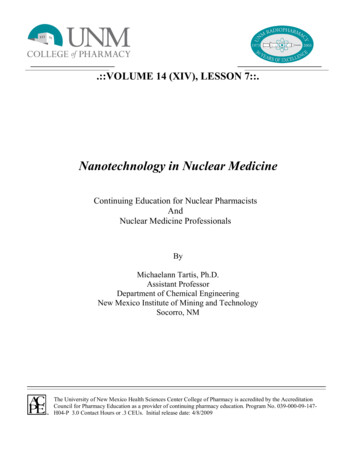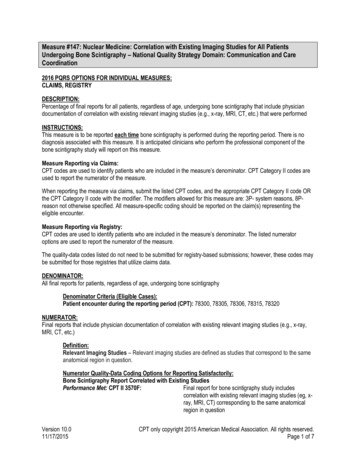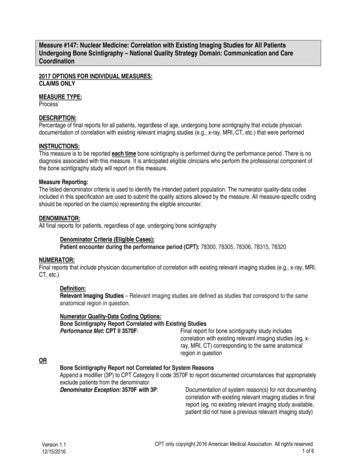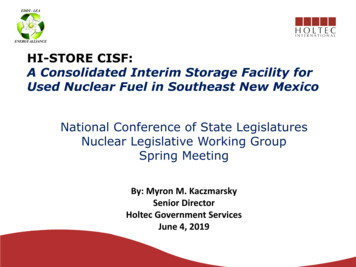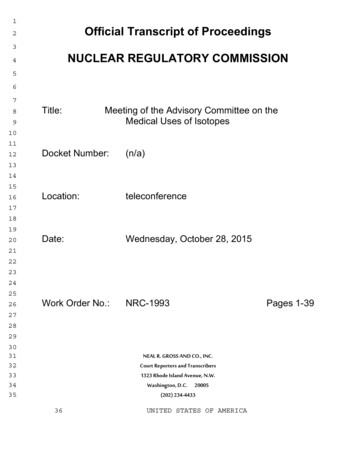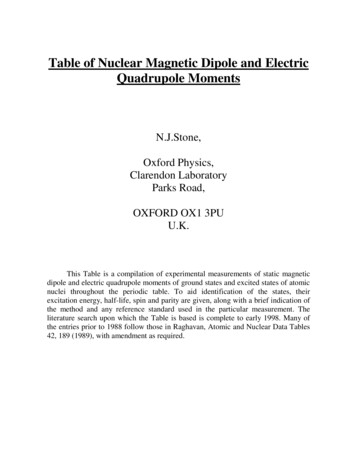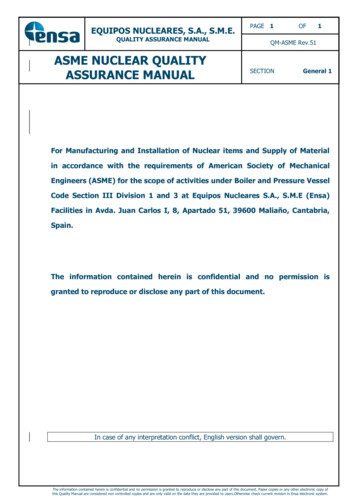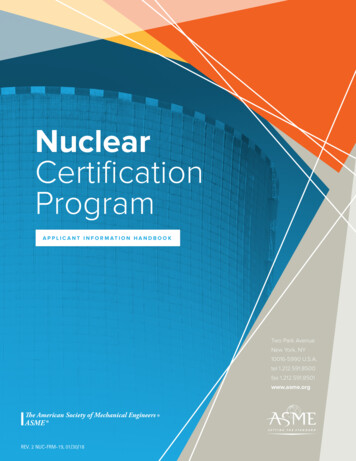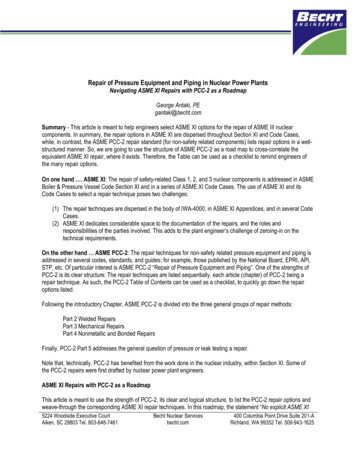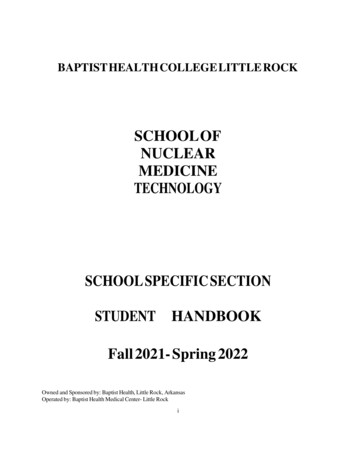
Transcription
BAPTIST HEALTH COLLEGE LITTLE ROCKSCHOOLOFNUCLEARMEDICINETECHNOLOGYSCHOOL SPECIFIC SECTIONSTUDENTHANDBOOKFall 2021- Spring 2022Owned and Sponsored by: Baptist Health, Little Rock, ArkansasOperated by: Baptist Health Medical Center- Little Rocki
CERTIFICATIONSTATEMENTBaptist Health, its schools and their administrators reserve the right to restrict, or limit enrollment in any course andmake changes in the provisions (organization, fees, program offerings, curricula, courses, requirements and so forth)in this handbook when such action is deemed to be in the best interest of the student or a particular school. Theprovisions herein do not represent, in any way, a contract between the student, prospective or otherwise, and theadministration of a school. This handbook replaces all handbooks previously published.NON-DISCRIMINATION STATEMENTBAPTIST HEALTH does not exclude or discriminate on the basis of race, color, creed, religion, gender, nationalorigin, age, disability, genetic information, or veteran status in accordance with applicable federal, state and locallaws.FORWARDThis handbook is provided to the student to serve as an overall guide to the Baptist Health College Little RockSchool of Nuclear Medicine Technology. Policies contained herein are current at the time of printing;however, policies, procedures and information contained within require continual evaluation, review, and approval.Therefore, the faculty and administration of the school reserve the right to change the policies, procedures andgeneral information at any time without prior notice, according to policy; all new and revised policies are postedon appropriate and designated student bulletin boards, for a defined period of time or students receiveelectronic notification of new or revised policies. Additionally, changes will be made on the website version.Students are expected to remain informed by checking the schools website regularly at www.BHCLR.edu.STATEMENT REGARDING STUDENT HANDBOOKStudents enrolled in the Baptist Health College Little Rock are responsible for information contained in the currentStudent Handbook and current Catalog. Students enrolled in a program of study are expected to comply with allpolicies of: a) Baptist Health College Little Rock, b) all institutions with which the schools are affiliated, and c) therespective program of enrollment. Additional details of policies that specifically pertain to a student’s specificprogram of enrollment are applicable and are located herein in the programs respective School Specific section.First Printed in 198437th EditionRevised 5/1/2021Baptist Health College Little Rock11900 Colonel Glenn RoadLittle Rock, AR 72210501-202-6200ii
BAPTIST HEALTH COLLEGE LITTLE ROCKSCHOOL OF NUCLEAR MEDICINE TECHNOLOGYSCHOOL SPECIFIC STUDENT HANDBOOKSECTION TABLE OF CONTENTSNew Student Welcome 5Introductory . 6History. 6Program Overview . 6Mission Statement . 6Values . 7Philosophy . 7Belief. 7Program Goals . 7Standards. 7Code of Ethical Conduct . 8Objectives of the Competency Based Curriculum . 8Accreditation, Approval, Licensure and Membership . 12Affiliations . 13Academic. 13Clinical .13Administration . 13AES . 14BHCLR Professional Staff . 15BHCLR Support Staff .15Academic . 15Academic Progress . 15Remediation .17Satisfactory Progress . 17Application and Entry Process . 17Application Requirements.18Entry Requirements .19Entry and Graduation. 19Prerequisite Requirements .19Application Final Date . 19Selection Committee .20Selection Process . 20Cost of the Program . 20Finance. 21Tuition Refund . 21Refund Methodology for Allied Health Students. 21Length of Program . 21Policies . 21Attendance Policies . 22Absences . 22Disciplinary Actions Related to Unexcused Absences . 22
Tardiness . 23Essential Functions . 23School Calendar. 24Class and Clinical Rotations . 25Makeup Work . 25Remediation . 26Academic Advising. 26Special Requirements for UCA Students . 26Graduation Requirements. 26Certification and Credentials. 27Student Appeal/Disciplinary/Dress Code . 27Behavioral Expectations in Clinical Rotations . 27Clinical Rotations . 28Level of Supervision during Clinical Rotations . 29Student Employment/Work Related Policies. 30Special Requirements for Affiliate University Students . 31Standards of Conduct . 31Clinical Instructor Responsibilities . 33Clinical Evaluations . 34Dress Code. 36Responsibilities of the School . 38What the School Expects from Students . 38Radiation Protection . 39Pregnancy . 40Program Effectiveness . 41Counseling/Resources . 42Student Health . 43Student Injury . 43Inclement Weather . 43Required Textbooks . 44Additional Information . 44CLEP . 44Transfer Course/Credit . 44Auditing Course . 44APPENDIX . 45Appendix I: Allied Health Cost Plan 2018-2019 . 46Appendix II: Clinical Competency Requirements 2019-2020
SCHOOL OF NUCLEAR MEDICINE TECHNOLOGYNEW STUDENT WELCOMEWELCOME to the Baptist Health College Little Rock (BHCLR) School of Nuclear Medicine Technology. Webelieve that you have made an excellent decision in choosing this type of allied health profession as your careerchoice. During the next 12 months, you will learn the basic principles and practices of Nuclear MedicineTechnology and develop competency in many of the clinical procedures that you will experience. This is anexciting time during which you will work alongside other allied health professionals, nursing professionals, andphysicians.The purpose of the Student Handbook is to acquaint you with the rules and regulations of the BHCLR School ofNuclear Medicine Technology, familiarize students with the objectives of both the theory and clinical portions of theprogram and inform you of the evaluative processes that will be used to determine your progress in both phases ofthe program.During your clinical training, you will experience the diversity of 11 different clinical sites offering specialtytraining in the areas of general diagnostic nuclear medicine imaging, pediatric imaging, PET/CT, CT, nuclearcardiology, nuclear pharmacy and radionuclide therapy.Read this Student Handbook thoroughly and carefully, as you are accountable for the information herein contained.If at any point in this program you need clarification of the contents of the handbook, please contact me at 501-2027919.Again, welcome to the BHCLR- School of Nuclear Medicine Technology. We look forward to teaching andlearning with you for the next twelve 12 months.Yours truly,Daniel GuffeyDaniel Guffey, MBA, CNMT, NMTCB(CT), RT(N)(CT)Program DirectorBaptist Health College Little Rock School of Nuclear Medicine Technology
INTRODUCTIONHISTORYThe BHCLR- School of Nuclear Medicine Technology was founded in 1979 as a clinical affiliate of St. VincentInfirmary. The hospital-based program was transferred to the sponsorship of Baptist Health in 1986. The schoolhas maintained full accreditation since its initial accreditation in 1987 by the Joint Review Committee onEducational Programs in Nuclear Medicine Technology (JRCNMT). The program is also accredited by theAccrediting Bureau of Health Education Schools (ABHES), and certified by the Arkansas Division of Higher Education.The school is affiliated with the University of Central Arkansas, Henderson State University, Arkansas TechUniversity and Southern Arkansas University for a 3 1 baccalaureate program, with the universities granting thegraduate a baccalaureate degree from that university at the successful conclusion of the program.PROGRAM OVERVIEWThe Assistant Vice President of Education/Chancellor for BHCLR has overall administrative authority andresponsibility for all schools and employee development within the department. The Program Director of theBHCLR-School of Nuclear Medicine Technology has overall operational responsibility with specifiedadministrative authority. The Program Director is responsible for planning, implementing and evaluating the totalProgram of Studies in accordance with the Arkansas Division of Higher Education, Accrediting Bureau of HealthEducation Schools, and the Joint Review Committee for Educational Programs in Nuclear Medicine Technology.The supervisors and coordinators of the clinical Nuclear Medicine departments at the various clinical sites assistboth the AVP and Program Director with their responsibilities and serve as their designees in the clinicaldevelopment of students during their rotation assignments. Respective AES’s have direct input to policydevelopment and operations as members of the BHCLR-School of Nuclear Medicine Technology AdvisoryCommittee.The BHCLR School of Nuclear Medicine Technology is comprised of faculty, students, administrative supportstaff and a Program of Studies that reflects a curriculum model for a student to achieve the educational goal of aNuclear Medicine Technologist.The School is committed to providing entry level job competent gr
cardiology, nuclear pharmacy and radionuclide therapy. Read this Student Handbook thoroughly and carefully, as you are accountable for the information herein contained. If at any point in this program you need clarification of th
